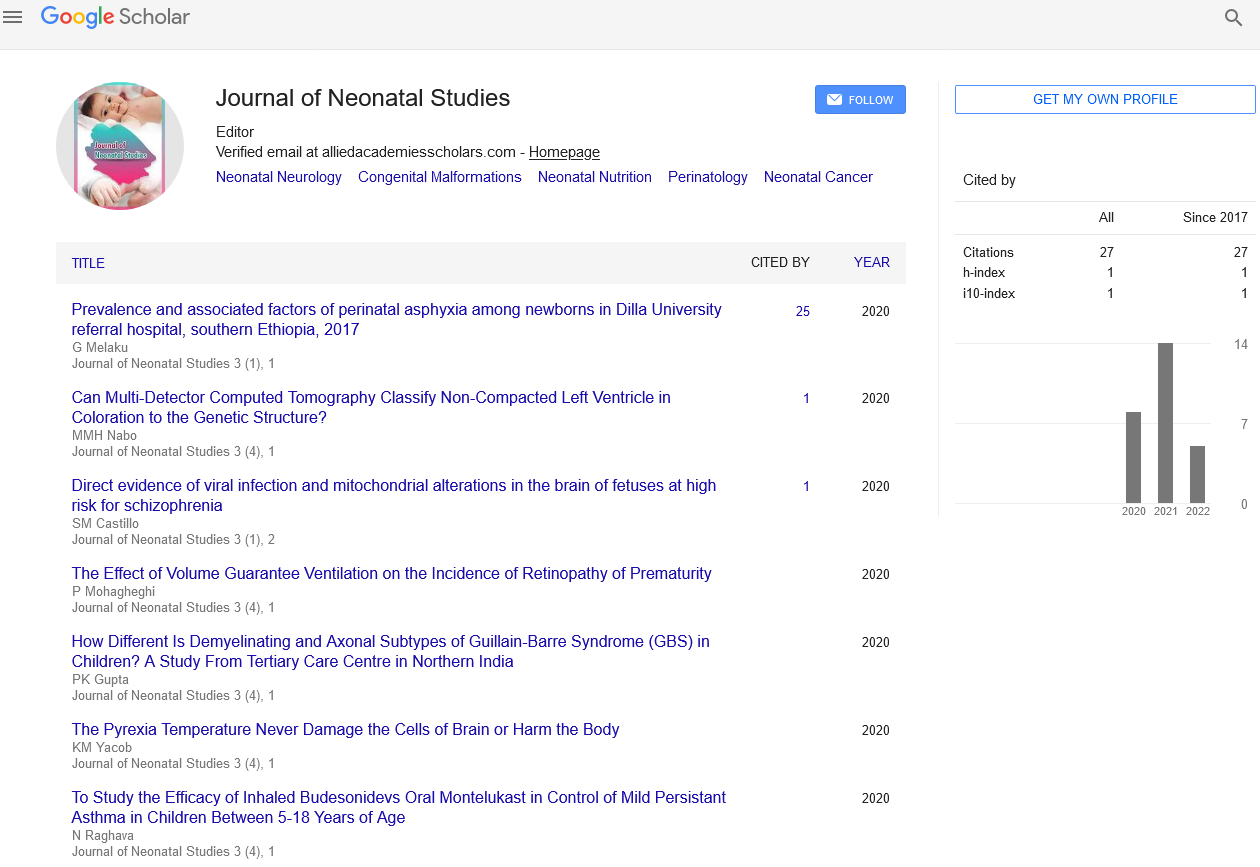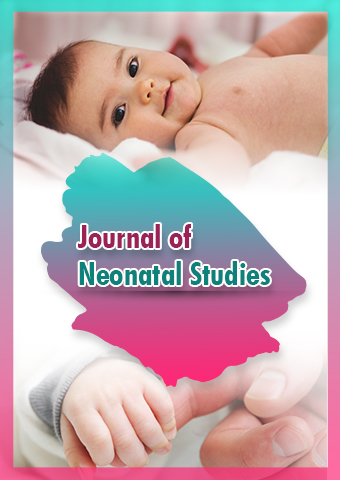Mini Review - Journal of Neonatal Studies (2023) Volume 6, Issue 2
Neonatal Genetics and the Importance of Neonatal Genetics
Andriole Katherine*
Brigham and Women’s Hospital, Harvard Medical School, Department of Radiology, Boston, Massachusetts, United States
Brigham and Women’s Hospital, Harvard Medical School, Department of Radiology, Boston, Massachusetts, United States
E-mail: dravrah.hwb.andriole@eloirdnak.edu
Received: 01-Apr-2023, Manuscript No. JNS-23-95939; Editor assigned: 3-Apr-2023, PreQC No. JNS-22- 95939(PQ); Reviewed: 17-Apr-2023, QC No. JNS-22-95939; Revised: 21- Apr-2023, Manuscript No. JNS-22- 95939(R); Published: 28-Apr-2023; DOI: 10.37532/jns.2023.6(2).29-31
Abstract
Neonatal genetics is the study of genetic disorders that manifest in newborns or within the first few months of life. Advances in genetic testing technologies have led to earlier and more accurate diagnosis of genetic disorders in neonates, providing opportunities for early intervention and treatment. This abstract provides an overview of the key concepts in neonatal genetics, including the importance of genetic counseling, the role of genetic testing, and the ethical considerations surrounding genetic testing in newborns. We also discuss some of the most common genetic disorders that affect neonates, such as Down syndrome, cystic fibrosis, and sickle cell disease, and the current state of research on potential treatments for these conditions. Finally, we examine some of the challenges and limitations of neonatal genetics, such as the cost and availability of genetic testing, and the potential for false positives or negatives in genetic testing results. Overall, neonatal genetics is an important field that has the potential to improve the lives of newborns and their families through early diagnosis, treatment, and management of genetic disorders.
Keywords
Neonatal genetics• Chromosomal abnormalities • Genetic mutations • Neonatal genetics• Genetic testing technologies • Genetic disorders
Introduction
Neonatal genetics is the study of genetic disorders that are present at or shortly after birth. These disorders can affect any part of the body, from the nervous system to the respiratory system, and they can be caused by genetic mutations, chromosomal abnormalities, or environmental factors [1].
Neonatal genetics is the study of genetic disorders that affect new-born infants. Genetics plays a critical role in the development and growth of an individual, and variations or mutations in genes can result in a wide range of health conditions. Some genetic disorders are present at birth, and the diagnosis and management of these conditions are essential for ensuring the health and well-being of the new-born. Neonatal genetic testing has become an increasingly important tool in identifying genetic disorders in infants, which can help healthcare providers make informed decisions about their care. With advances in technology, genetic testing has become more accessible and accurate, enabling healthcare professionals to diagnose and manage genetic disorders more effectively. The field of neonatal genetics continues to evolve rapidly, and ongoing research aims to improve our understanding of genetic disorders and develop new treatments to improve outcomes for affected infants [2, 3].
Neonatal genetics is a field of medicine that focuses on the study of genetic disorders that affect infants within the first month of life. These disorders may result from inherited genetic mutations or de novo mutations that arise during early embryonic development. Neonatal genetics is an interdisciplinary field that involves geneticists, neonatologists, pediatricians, genetic counselors, and other healthcare professionals. The field aims to identify and diagnose genetic disorders in newborns, provide genetic counseling to families, and develop targeted treatments for genetic conditions. Advances in neonatal genetics have enabled early detection of genetic disorders, leading to improved outcomes and quality of life for affected infants and their families [4, 5].
Discussion
The importance of neonatal genetics
Neonatal genetics is important because it can help doctors and families better understand and manage genetic disorders in infants. Many genetic disorders can be difficult to diagnose, and even more difficult to treat. Neonatal genetic testing can help doctors identify genetic disorders early, allowing for earlier intervention and better outcomes. Some genetic disorders can be lifethreatening, so early diagnosis and treatment can be crucial. In addition, some genetic disorders can cause developmental delays or other longterm health problems that may be prevented or mitigated with early intervention [6].
Neonatal genetics is the study of the genetic factors that influence the development and health of newborns. This field is important because it can provide valuable information that can help diagnose and treat genetic disorders that can affect a child’s growth and development.
Here are some reasons why neonatal genetics is important:
Early diagnosis of genetic disorders: Neonatal genetics can help diagnose genetic disorders early in life, allowing for prompt treatment and management. This can improve a child’s quality of life and reduce the risk of complications later in life.
Improved treatment options: By understanding a child’s genetic makeup, doctors can tailor treatment plans to their specific needs. This can lead to more effective treatments and better outcomes for the child.
Genetic counseling: Genetic counseling can help parents understand the risks of passing on genetic disorders to their children. This can help them make informed decisions about family planning and reduce the risk of passing on genetic disorders to future generations.
Research: Neonatal genetics research can help identify new genetic disorders and improve our understanding of how genetic factors impact child development. This can lead to the development of new treatments and therapies [7].
Common neonatal genetic disorders
There are many different types of genetic disorders that can affect newborns. Some of the most common include:
Down syndrome: Down syndrome is caused by a chromosomal abnormality that results in an extra copy of chromosome 21. It is the most common chromosomal disorder in newborns.
Cystic fibrosis: Cystic fibrosis is a genetic disorder that affects the respiratory and digestive systems. It is caused by a mutation in the CFTR gene.
Sickle cell anemia: Sickle cell anemia is a genetic disorder that affects the production of hemoglobin, which is the protein in red blood cells that carries oxygen throughout the body. It is caused by a mutation in the HBB gene.
Phenyl ketonuria (PKU): PKU is a genetic disorder that affects the body’s ability to break down the amino acid phenylalanine. It is caused by a mutation in the PAH gene.
Spine bifida: Spina bifida is a birth defect that affects the development of the spinal cord. It is caused by a combination of genetic and environmental factors [8].
Neonatal genetic testing
There are many different types of neonatal genetic testing that can be done to identify genetic disorders in newborns. Some of the most common types include:
Carrier screening: Carrier screening can identify parents who are carriers for certain genetic disorders. This can help parents make informed decisions about having children. New-born screening: New-born screening tests can identify new-borns who may be at risk for certain genetic disorders. These tests are usually done shortly after birth and are required by law in most states. Diagnostic testing: Diagnostic testing can be done to confirm a diagnosis of a genetic disorder in a new-born. This can include genetic testing, imaging tests, and other diagnostic tests.
Conclusion
Neonatal genetics is an important field of study that can help identify and manage genetic disorders in newborns. Early diagnosis and intervention can be crucial for the health and wellbeing of newborns with genetic disorders, and neonatal genetic testing can help make this possible. As technology continues to advance, it is likely that neonatal genetics will become even more important in the years to come. Neonatal genetics is an important field that can help diagnose and treat genetic disorders early in life. It can also provide valuable information for genetic counseling and lead to new discoveries in the field of child development [9, 10].
Acknowledgement
None
Conflict of Interest
None
References
- Nair AG, Potdar NA, Dadia S et al. Patient perceptions regarding the use of smart devices for medical photography: results of a patient-based survey. Int Ophthalmol. 39, 783-9 (2019).
- Bronsard N, Chignon Sicard B, Amoretti N et al. Interest of including trauma photography in the picture archiving and communication system of a teaching hospital. Orthop Traumatol Surg Res. 101, 387-90 (2015).
- Schröder G. Bei Wunddokumentation nicht verunsichern lassen. Heilberufe. 71, 26-30 (2019).
- Sanger PC, Simianu VV, Gaskill CE et al. Diagnosing Surgical Site Infection Using Wound Photography: A Scenario-Based Study. J Am Coll Surg. 224, 8-15 e1 (2017).
- Bouillon B, Marzi I. The updated German “Polytrauma–Guideline”: an extensive literature evaluation and treatment recommendation for the care of the critically injured patient. Eur J Trauma Emerg Surg. 44, 1 (2018).
- Friesen MR, Hamel C, McLeod RD. A mHealth application for chronic wound care: findings of a user trial. Int J Environ Res Public Health. 10, 6199-214 (2013).
- Verhoff MA, Kettner M, Laszik A et al. Digital photo documentation of forensically relevant injuries as part of the clinical first response protocol. Dtsch Arztebl Int. 109, 638-42 (2012).
- Esser P. Fotodokumentation: Gebühren-, Technik- oder keine Leistung? Der Freie Zahnarzt. (2019).
- Bryson D. Operating theatre photography for personal injury cases. J Audiov Media Med. 22, 75-82 (1999).
- de Carvalho RM, Mazzer N, Barbieri CH. Analysis of the reliability and reproducibility of goniometry compared to hand photogrammetry. Acta Ortop Bras. 20, 139-49 (2012).
Indexed at, Google Scholar, Crossref
Indexed at, Google Scholar, Crossref
Indexed at, Google Scholar, Crossref
Indexed at, Google Scholar, Crossref
Indexed at, Google Scholar, Crossref
Indexed at, Google Scholar, Crossref
Indexed at, Google Scholar, Crossref

